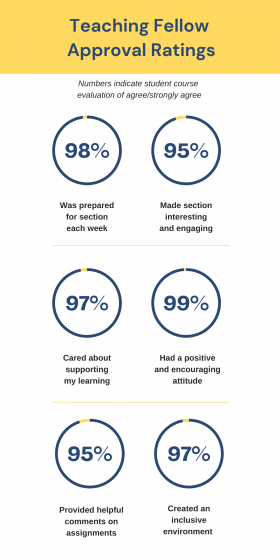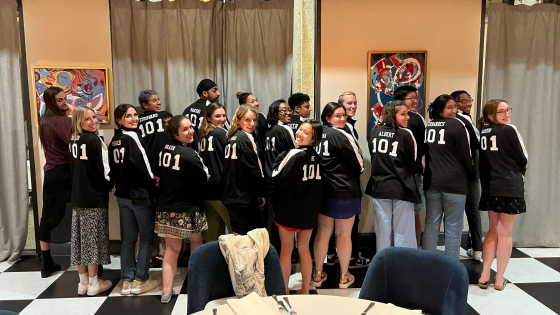Cara August, Trinity Communications

“There are a lot faculty who wish they had course evaluations that look half this good.”
Reviews that positive are not something you expect to hear from a professor about teaching by undergraduate students, but it’s just what Bridgette Martin Hard said about the Costanzo Teaching Fellows.
Spearheaded by Hard, an associate professor of the practice of Psychology & Neuroscience who teaches Psych 101 to more than 600 Duke students each academic year, the Costanzo Fellows are a team of Duke seniors who assist Hard by leading small discussion sections for mostly first-year students in the mammoth introduction to psychology course.
Hard is an expert in pedagogy who joined Duke in 2017 as part of a larger departmental effort to expand its peer-teaching model. Each spring, she selects a cohort of about 20 rising seniors from a large and competitive pool of applicants, all of whom were once first-year students in her Psych 101 class.
Those selected as Costanzo Fellows become paid members of the course’s teaching team. With training and guidance from Hard, they spend the academic year teaching their own small sections (two in the fall and one in the spring) to their younger Duke peers, making the course particularly supportive for first-year students.
It’s a collaborative peer-teaching model built on layers of support, trust and credibility — and course evaluations show it’s working.

Introductory psychology is valuable and interesting for a wide swath of incoming Duke students, which is one reason it’s such a highly enrolled class. Students learn about themselves and the world around them — and about psychological concepts that apply to everyday experiences in health care, law, policy, business and elsewhere.
But the undergraduate Teaching Fellows are arguably the critical element in making the course special. Capped at 15 students per section, the small size of the Psych 101 discussion groups allows for a greater sense of community to develop.
“Without the Teaching Fellows we would just be a big class of 300 students, all of whom would feel like anonymous people in a seat,” Hard said. “The fellows make the course personal — and that’s really important. We’re not only introducing these new students to amazing course content, but we’re also helping ease them into college.”
“The class was very personalized in discussion sections because we had small group conversations and participated in hands-on learning activities each week,” said sophomore Reed Lessing.
The proximity in age between the Psych 101 students and Teaching Fellows is a notable factor in the rapport that’s formed between the two groups. Because the seniors are not that far removed from the experience of being a first-year student themselves, they recall what it’s like to be new to Duke, sitting in a large lecture hall with hundreds of others, as well as the feelings of stress, pressure and excitement that often accompany the start of college.
As such, the Teaching Fellows serve as mentors for the younger students, who come to them each week in section not just for help in the class, but also to talk to about life and school more broadly.
“Being led by someone who had been in our shoes meant that we had someone to turn to who was on our side, who could teach us not only about psychology, but also about what is expected of students at Duke in general,” said rising sophomore Dav King, who was one of six students to receive an award for his Psych 101 research project last fall.
Having already taken Advanced Placement psychology in high school, King was initially bothered that Psych 101 was a degree requirement and thought there would be little purpose in taking a massive lecture class.
“By the end, I was incredibly grateful that Psych 101 was required for all Psychology majors,” he said. “The class was a blast, and the small discussion section is the best I've been a part of at Duke.”

Developing scientific research skills is another factor that makes the course unique. Students are required to complete an ambitious paper that explores an original research question with defined methods for addressing it.
It’s the Teaching Fellows who offer guidance and support along the way.
Through the research and writing process, students enrolled in Psych 101 learn how psychological and other sciences work and how to reason scientifically about a question that interests them. They also develop their writing by giving and receiving critical feedback, constructively.
Reflecting on the experience of completing her Psych 101 culminating project, Lessing — also a student award recipient for her work — noted that her Teaching Fellow was always eager to answer questions and offer her guidance throughout the semester.
“Workshopping my writing and research with a peer editor helped me to refine the methods and scope of my study and gave me insight into what it might be like to serve as a peer reviewer on a psychology journal.”
Like most novice educators, the Teaching Fellows tend to start the year by sticking close to the provided lesson plans, gradually building confidence and making the material more their own by swapping discussion activities or adding personal storytelling, a teaching tool that Hard models in her Psych 101 lectures.
In its essence, the Costanzo Fellowship is a capstone experience for the seniors in the undergraduate teaching team — a chance to go back to one of their first experiences as a Duke student in a dedicated leadership role.

Duke alumnae and former Teaching Fellow Cathy Chen recalls that her Psych 101 Teaching Fellow inspired her to consider a Psychology major.
“Like them, I also wanted to be an enthusiastic presence and show how psychological concepts are useful in the everyday,” she said.
To ensure Teaching Fellows are able to offer that leadership, Hard designed the program to provide multiple layers of feedback.
Each Costanzo cohort takes a one-credit teaching seminar together in the fall, and they have regular opportunities to practice and troubleshoot common teaching challenges. They take turns demonstrating a lesson to their peers, visit each other’s sections for ideas and inspiration, share teaching resources and small group activity ideas and watch themselves on video to gain insight on teaching methods and presentation skills.
“We’re constantly trying to improve and think things through together, as team,” Hard said.
For Chen, the most enjoyable part of her teacher training was being paired with another fellow to create and present a new lesson plan.
“It was fun to be partnered with someone I hadn’t collaborated with before and to see how we could play off of each other's strengths to give a harmonious presentation,” Chen said. “It was interesting to brainstorm ideas for new ways to present concepts and think critically about the feedback we received from our peers to improve for future lessons.”

The investment in collaboration and peer support helps the Teaching Fellows develop confidence and creates a team comradery that carries over to the small discussion sections, benefitting students in Psych 101 as well.
Toby Chen, ’22, (no relation to Cathy) a double major in Psychology and Chemistry with a minor in Biology, decided to major in Psychology largely because of his experience as a first-year in Psych 101 and his close relationship with his Teaching Fellow.
“As an introverted student, I would have never applied to a program where I had to speak in front of 15 strangers for an hour,” Toby said. But he wanted to stretch himself, so he reached out to his Teaching Fellow and Hard, both of whom encouraged him to apply.
The experience was transformational for Toby — so much so that he’s completing his second year as a Teaching Fellow, a rarity in the program, having also served in the role as a junior.
“Becoming a Teaching Fellow taught me how to share ideas effectively and work in a team,” he said. “I learned to manage my time better and improve my conversation skills. I became a better listener, and I grew into someone who is a leader and a mentor.”
Being inspired by peer Teaching Fellows is a common theme among Psych 101 students and part of what makes the program special.
“The Teaching Fellow model has worked really well, and the younger students are often inspired to become leaders — it shows them that they can be someone who makes a difference for their peers,” Hard said.
King, who is leaning toward declaring Psychology as his major, agrees.
“From early in the semester — before I won the project award, and before I knew the fellowship was a paid opportunity — I was planning to apply to become a Teaching Fellow,” he said. “I loved [Psych 101]. I loved Dr. Hard and her dedication to teaching, and in every way this program seemed perfect for me to gain experience in the psychology field.”